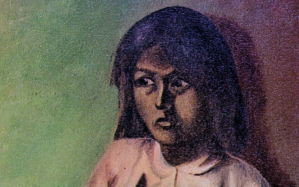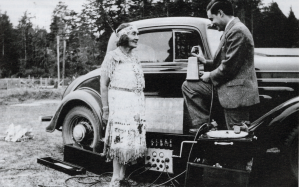IN THE NIGHT OF MEMORY.
A novel by Linda LeGarde Grover.
April 2019. University of Minnesota Press.
ISBN 978-1-5179-0650-4
Hardcover 224 pages. $22.95.
Review by Richie Swanson, richieswanson.com
Linda Legarde Gover of the Boise Forte Band of Ojibwe has written another masterful novel of Indian life in northern Minnesota, In the Night of Memory. She dedicates the story to “missing Native women and all who grieve them.” The title of her first chapter, The Surrender of Children, calls forth the history that drives Grover’s passion, the shock wave that this great American writer lays bare in much of her work.
Azure Sky and Rainy Dawn are nearly three and four-years-old as their mother disappears behind the doors of an elevator on her way to a county social worker in Duluth. The sisters enter 1980s foster care that belittles and threatens them. When a washing machine falls apart in one foster home, an angry husband blames the extra clothes from the Indian kids “who should just go back to the reservation.” In the next home Rainy is considered “retarded,” and both sisters, “ungrateful snots” and “Fodder for Hell.” Yet the girls find joy and strength where they can, relishing such moments as when sinners unexpectedly stand and confess in church. “How we enjoyed the details they shared, egged on by their fellow Sinners Saved,” says Azure.
I would have been captivated by Azure’s voice throughout the entire novel. But Grover has too much wherewithal to let Azure navigate so many hostile settings alone. Instead Grover mingles Azure’s voice with Anishinaabe (Ojibwe) relations who have grown wise from their own histories of dispossession and strive to return Azure and Rain to what they “should have been, `Anishinaabi-oshkinikwe, cared for and even spoiled a little.’”
I got to know the sisters’ story by dunking tooth-breaking cookies in coffee with relations who understood the Indian Child Welfare Act. And by attending a powwow with a cousin who knew the girls’ mom as a child “full of beans and mischief” who playfully imitated Queen Elizabeth. And by having lunch at Elder Housing with Auntie Girlie, who can’t forget that the girls’ mama came from a corner of reservation historically destitute for lack of allotments, where the “real Indians” practiced old customs and traditions as much as their lives allowed.
The girls’ mom came from a world where families were linked by their “missing children,” who were shipped to boarding schools and “locked up, beaten, and abused.” And from a world where Native woman disappear so commonly their tragedies don’t even make the news. No Hollywood drama here. No desperate suicides or nail-biting rescues. In the Night of Memory is beautifully quiet. It breathes the silence of the deeply deprived and deeply wounded, and also the quiet of courageous resolve and the collective love of the Ojibwe.
The night before Mama vanishes, she wakes Azure and Rain to witness the northern lights, and dances in traditional Ojibwe steps, lifting an invisible eagle fan to return a prayer of the “singing winds.” Throughout the novel Azure longs to see her mother wrap her sister tenderly in a blanket again beneath the lights, and to hear Mama amid the music that rumbles like wind and sings like music up in the lights.
“It was also said that the northern lights were the glow of torches that the grandfathers used to illuminate the Path of Souls for their soul-spirits on their way to the Land of Peace,” wrote Basil Johnston in Ojibway Heritage. Grover’s novel serves the same purpose. Azure and her relations shine illuminating flames on how a loving and conscientious community can fortify and bring some peace to those traumatized and abandoned by official policies and racism that regard them as less human than the United States’ dominant culture.
Review appeared in Whispering Wind Magazine Vol. 47 No. 1 Issue 317










